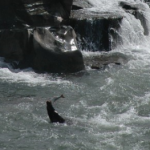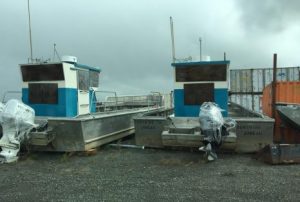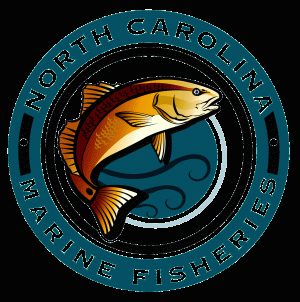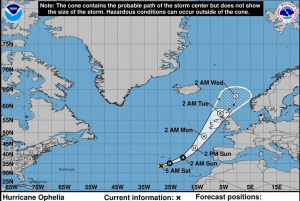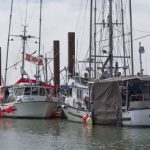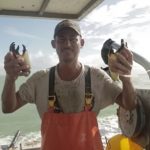Category Archives: Pacific
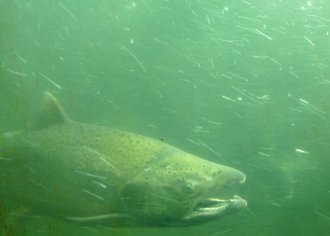
Fish Commissioner Calls For Sharp Increase In Chinook Production For Orcas
Fifty million more Chinook would be released for southern resident killer whales under a plan being pitched by a member of the Washington Fish and Wildlife Commission and which would also provide “shirttail benefits” for salmon anglers. Don McIsaac wants to release 30 million kings in four areas of Puget Sound, and another 20 million from hatcheries in the Columbia River system to help feed the starving pods. Their plight has gripped the region this summer and this past March led Governor Jay Inslee to sign an executive order directing state agencies such as WDFW to do all they can to help save the species. >click to read<20:18
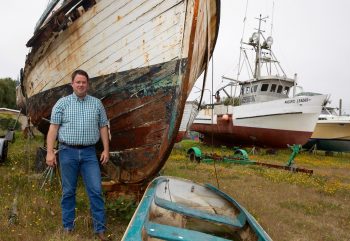
When a ship owner’s dreams die – Recycling Washington’s ghost ships could turn trash into treasure
This is an example of where owning an old boat ends with reality, a case of folks with “great dreams and aspirations, and no money,” says Troy Wood, the man in charge of dealing with derelict vessels in Washington. The unenviable job falls to the Department of Natural Resources, which manages 2.4 million acres of state-owned aquatic lands. There’s an old saying that a boat is simply a hole in the water into which you dump your cash. They can be cheap to buy, but are expensive to maintain, insure, berth, repair and operate. They age, they weather, they often sink. When they do, they create another kind of money hole: a maritime cleanup project often leaves taxpayers with the bill for removal. >click to read<09:36
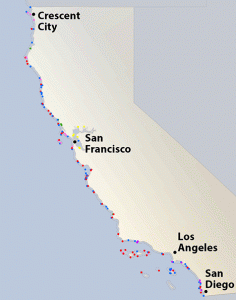
‘Greedy Poachers’ Face Stiffer Penalties Under New Law Drafted by San Diego Assemblywoman
A bill authored by a San Diego lawmaker that cracks down on illegal poaching in marine protected areas by commercial fishing operators has been signed into law by Gov. Jerry Brown. Assemblywoman Lorena Gonzalez Fletcher‘s bill (AB-2369) takes effect Jan. 1. and was signed by the governor Friday. “These greedy poachers have done an enormous amount of damage, showing that the current penalties are nominal to their bottom line and they don’t seem to work. I’m pretty sure this new law’s threat of a hefty fine will get their attention.” >click to read<08:56

Humpback whale killed by ship will become feast for Washington tribe
A 31-foot (9.5-meter) humpback whale struck and killed by a ship is being turned into a feast by the Makah Indian Tribe. The tiny tribe with a reservation on the northwestern tip of the Olympic Peninsula in Washington state has been butchering the whale that was pulled ashore Thursday. “It is sacred,” Nathan Tyler, chairman of the Makah Indian Tribe, told The Seattle Times . “We have deep regrets about the whale being struck by a ship and dying, but it will live on, through our culture.” Tribal fisherman discovered the whale Thursday in the Strait of Juan de Fuca near Sekiu. >click to read<21:58
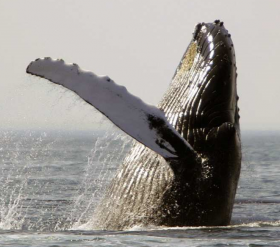
Trump administration settles lawsuit, agrees to protect humpback whale habitat
The suit by the Center for Biological Diversity, Turtle Island Restoration Network and the Wishtoyo Chumash Foundation, a nonprofit that represents American Indian tribes, was settled Friday in federal court in San Francisco. The National Marine Fisheries Service agreed to designate critical habitat for the animals by mid-2019 and finalize those boundaries a year later. It means the migration routes of three endangered or threatened populations of humpbacks on the West Coast will be protected. >click to read<09:40
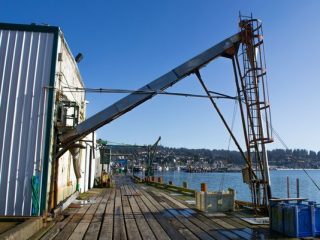
Trident Seafoods fined a third time for polluting Newport’s Yaquina Bay
Oregon environmental regulators have fined Trident Seafoods Corp. $43,200 for wastewater violations at its Newport surimi factory. It’s the third time since 2015 the state Department of Environmental Quality has fined the company for polluting Yaquina Bay. Seattle-based Trident Seafoods is the largest seafood company in the United States and among the largest in the world.
In Newport, the company holds a permit to discharge treated fish-processing wastewater into the bay from its factory, at 623 Yaquina Bay Boulevard, which processes fish into the imitation crab meat. >click to read<11:52
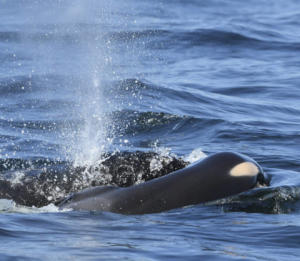
Giving up Chinook Is a Nice Idea but It Will Not Save the Orcas
The Seattle Times published a heart-warming/heart-breaking story Wednesday about chef Renee Erickson, who recently announced that she will be yanking Chinook salmon from her restaurant menus in response to Tahlequah, aka J35, the Salish Sea orca who became an international cause célèbre after carrying her dead baby for 17 days. “It’s sad,” Erickson told the Times. “I love eating [chinook], and I grew up catching it.” But, she added, “The biggest gut wrench is that we have starving orcas. We are eating the salmon they need to eat.”,, Taking chinook off restaurant menus (and your own shopping list) is a commendable action. But, unfortunately, it won’t save the whales. It’s kind of like every other environmental crisis: >click to read<09:59

Wrong man in prison for 2009 murder?
Only two people know what really happened on the July 2009 night when 52-year-old fisherman John Adkins was murdered at the Port of Ilwaco. His deckhand Walter Bremmer moved to Hawaii within days, then negotiated full immunity in exchange for his testimony. His business partner Erin Rieman pleaded guilty to manslaughter and went to prison for 11 years. It seemed like a closed case until 2012, when Bremmer murdered his neighbor Robert “Johnny” Leong using the same unusual method that was used to kill Adkins. With Bremmer in prison, Rieman appealed his case over and over, saying he only took the fall because Bremmer threatened to kill his girlfriend, daughter and grandkids.,, Recently, a federal magistrate concluded Rieman’s crazy story just might be true. >click to read<
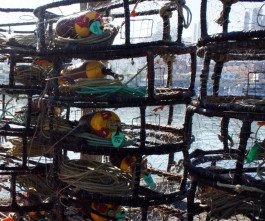
Crabbers to get federal disaster relief
The California Department of Fish and Wildlife (CDFW) has proposed a spending plan for federal Dungeness Crab disaster relief funding after taking input from fishermen, processors and charter boat operators. The state’s 2015 to 2016 commercial Dungeness and rock crab seasons were declared as fisheries disasters after being drastically curtailed due to algae blooms and the domoic acid toxin they produced. Approval of $28.8 million in federal relief funding was gained last June, with most of it covering Dungeness losses. Based on guidelines from the federal National Oceanic and Atmospheric Administration (NOAA) and feedback from industry stakeholders, CDFW proposes that 89 percent of the relief funding be spent on “direct payments” to commercial fishermen, buyer/processors and sport charter boat operations. >click to read<19:31

Farmers protest California water plan aimed to save salmon
Hundreds of California farmers rallied at the Capitol on Monday to protest state water officials’ proposal to increase water flows in a major California river, a move state and federal politicians called an overreach of power that would mean less water for farms in the Central Valley. “If they vote to take our water, this does not end there,” said Republican state Sen. Anthony Cannella. “We will be in court for 100 years.” Environmentalists and fishermen offered a different take on the other side of the Capitol to a much smaller audience. “For the 50 years corporate agriculture has been getting fat,” said Noah Oppenheim of the Pacific Coast Federation of Fishermen’s Associations. “Salmon fisheries have been tightening belts.” >click to read<13:17
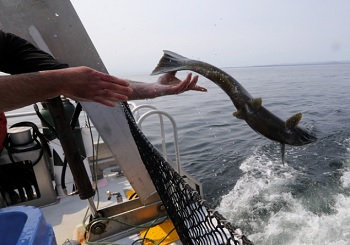
Dosed salmon, clipped fins, a ‘dinner bell’: How far is too far in helping starving orca?
The emergency effort to save a critically ill orca whale is an experiment without precedent. An international team of scientists is piloting techniques to treat a wild, free-swimming orca, one of the largest predators on Earth. The effort includes serving up live fish pumped with medicine and playing a unique tone that one researcher likened to a “dinner bell.” A federal permit approved Aug. 8 provides the clearest look yet at the details of an operation that raises questions even for those involved about the proper limits of human intervention. >click to read<17:39

Coast Guard law enforcement assists injured woman, investigates fisherman for BUI off of Oregon Coast
A Coast Guard law enforcement team assisted an injured woman and are investigating the circumstances surrounding a commercial fisherman allegedly boating under the influence 12 miles off the Oregon Coast, Friday morning. A Coast Guard boat crew and law enforcement team aboard a 47-foot Motor Life Boat from Station Umpqua River removed the woman, reportedly suffering from a head laceration, bruising and swelling in the facial region, off the commercial fishing vessel Pescadero and transferred her to emergency medical services awaiting at Station Umpqua River, which transported her to Lower Umpqua River Hospital. >click to read<20:04

Center for Biological Diversity sues Trump administration to expand protected Southern Resident orca habitat along West Coast
The Tucson, Arizona-based Center for Biological Diversity said as it filed the lawsuit in U.S. District Court in Seattle.,,The lawsuit says the National Marine Fisheries Service has failed to act on the center’s 2014 petition to expand habitat protections to the orcas’ foraging and migration areas off the coasts of Washington, Oregon and California — even though the agency agreed in 2015 that such a move was necessary. The center says the protections would help reduce water pollution and restrict vessel traffic that can interfere with the animals.“ click to read<16:36
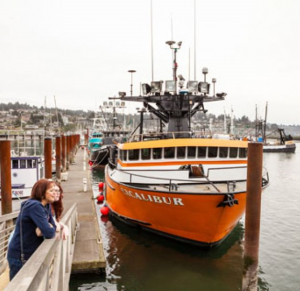
Salmon decline reveals worrisome trend
The sad story of an orca carrying her dead calf for 17 days off the Washington coast this month has garnered global attention to the plight of killer whales in the region. It has also highlighted the steep decline in the region’s salmon stocks, the resident orcas’ sole food source. ,, That is because the availability of Pacific Ocean salmon has been trending low for the past decade. The total pounds of chinook salmon caught off the Oregon coast in 2017 fell 40% compared with the year before, according to Oregon Department Fish & Wildlife (ODFW) data. Between 2014 and 2017, total pounds caught dropped 80% and the value of the catch dropped 72% to $5 million. Drought in California and nutrient-starved ocean conditions are blamed for the decline. >click to read<16:15
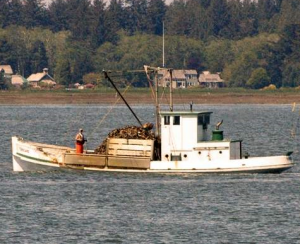
Old Willapa boats get new lives – May West to serve as concert stage; Tokeland will be historical exhibit
With the Jazz and Oysters music festival moving to the Port of Peninsula (PoP) in Nahcotta this weekend, it seems right that the musicians would be performing on a stage befitting the event. The deck of the former oyster dredge May West will be making its official debut as a stage at the annual event, after the Northern Oyster Company donated the retired vessel to the port earlier this summer.,, The barge is one of two retired oyster boats that have been donated to PoP recently, with the Herrold family also having contributed their historic boat, Tokeland. >click to read<11:56
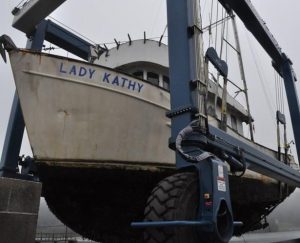
F/V Lady Kathy comes up for air after 20 years
Local fishing vessel, the Lady Kathy, was hauled out of the Charleston Marina on Monday for the first time in over 20 years for maintenance. Owner of the boat Richard Shore inherited the Lady Kathy from his father a couple of years ago. The boat, named after Shore’s grandmother, was built in 1971 by his grandfather and father. “It’s been a long time, about 20 years since it was last hauled out. That’s suicide for any other boat. Usually you take it out once a year,” Shore said. 3 image >click to read<16:14
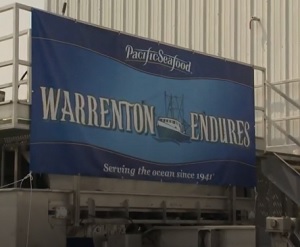
After fire destroys seafood processing plant, Pacific Seafood celebrates their plant reopening in Warrenton
Pacific Seafood in Warrenton celebrated its grand re-opening Tuesday, five years after fire destroyed the seafood processing plant. “It’s been a great day that’s taken five years to achieve,” Pacific Seafood President & CEO Frank Dulcich said. “I’m extremely proud of our community and this team.” On June 4, 2013, a massive fire that broke out at the facility, while contractors torched a new, tar roof. “Within 45 minutes the whole building was engulfed in flames,” recalled Dulcich. “There was a lot of sadness.” Video >click to read<09:27
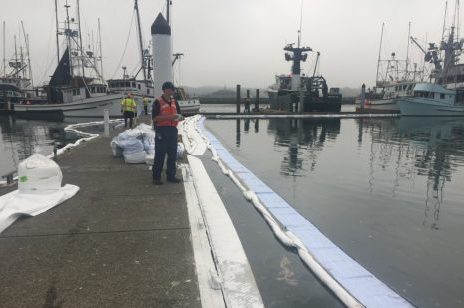
Coast Guard responding to diesel spill in Newport’s Yaquina Bay
The Coast Guard is responding to a diesel spill of approximately 700 gallons that occurred in Yaquina Bay in Newport, early Tuesday morning. Coast Guard oil spill responders from Sector Columbia River’s Incident Management Detachment in Portland arrived on scene at 11 a.m. to oversee cleanup efforts that began when local responders deployed containment booms and applied sorbents. Coast Guard watchstanders at Sector North Bend and Sector Columbia River received a report of the diesel spill at 12:30 a.m., from a representative of NWFF Environmental. The spill reportedly happened when the crew of the commercial fishing vessel Coast Pride left a transfer pump on. >click to read<19:35
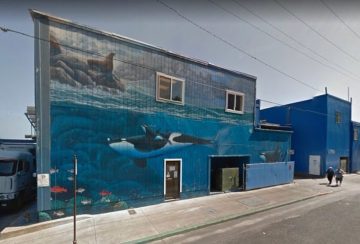
Pacific Seafood wants to buy Bayfront area properties to house their workers
Pacific Seafood processing is asking Newport City Hall to allow them to create their own worker housing because their workers can’t find affordable housing in Newport. Pacific Seafood will be sitting down with city planning commissioners August 13th to work out some changes to the city code to allow the company to provide workforce housing for its workers by acquiring properties on, or near, the Bayfront so their workers can have a place to live and not have it cost them an arm and a leg. >click to read<10:36
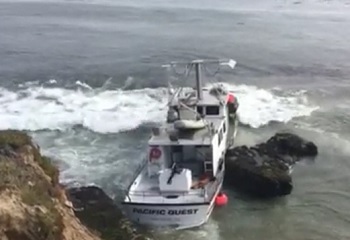
UPDATED – Unified command responds to grounded vessel near Santa Cruz
The Coast Guard, National Oceanic and Atmospheric Administration, Monterey Bay National Marine Sanctuary, California Department of Fish and Wildlife’s Office of Spill Prevention and Response (OSPR), Monterey County, Santa Cruz Fire Department and a representative of the vessel owners have established a unified command in response to a 56-foot commercial fishing vessel that ran aground with a maximum potential capacity of 1,200 gallons of diesel aboard near Natural Bridges State Park, Sunday morning. The captain of the fishing vessel, Pacific Quest, contacted Coast Guard Sector San Francisco watchstanders at approximately 2 a.m. Sunday, reporting that his vessel ran aground with only himself and his dog aboard. >click to read<06:38
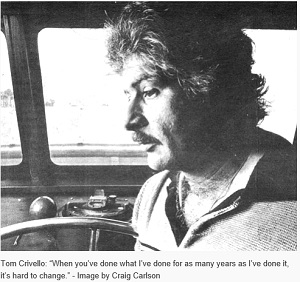
The fisherman and the government observer – Tuna by the ton: two tales of fishing
Tom Crivello is a tuna boat captain and owner of two large seiners, both of which carry helicopters that are used in hunting for tuna. Crivello’s two boats are the Rose Ann Marie, which is 220 feet long with a capacity of 1050 tons of fish, and the Marla Marie, which is 151 feet long and holds about 500 tons. They are both registered in the U.S. and are based in San Diego, along with about 125 other boats from the American tuna fleet of nearly 140 boats. About a year ago, after fishing for twenty-one years — since the age of sixteen — Crivello decided to retire and try to sell the Rose Ann Marie, which is valued at about five million dollars. He was feeling the effects of relentless pressure and he was determined to do something about it while he still was capable. Others had reached the limit, pressed on, and ended up with drinking problems or even nervous breakdowns. >click to read< 8 pages from May 13, 1982 18:35
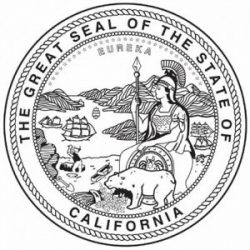
Senate Bill 1309 – There’s a compelling case for more transparency in California fisheries.
Figuring out who owns the right to fish commercially on the Pacific Coast is typically easy: In fisheries managed by the states of Alaska, Hawaii, Oregon and Washington, as well as the federal government, all you have to do is ask. California is an outlier. Here, the names of individuals and companies that own the right to fish in state-managed fisheries are confidential.,,, Through my investigation I found the wording of the confidentiality provision hadn’t been changed since 1933, even though at that time, there were no fishing rights to own. Times have changed, but the law hasn’t. Now commercial fishing rights, or limited-entry permits as they’re known in the industry, are worth more than $100 million and bought and sold on an open market. Consumers – as well as fishermen – don’t have the right to know who owns what in state-managed fisheries. >click to read<16:26
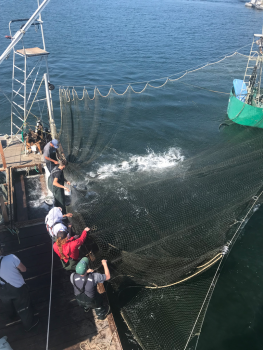
They’re big, they’re fat and thankfully there are finally a whole lot of ‘em!
It’s early, but the Fraser River sockeye salmon run is looking strong for fishermen in U.S. waters. The season started earlier this week for commercial fishermen, with salmon coming in large numbers through the Strait of Juan de Fuca and heading toward Canadian waters. There are a lot of the fish, and they are fat, said Riley Starks, of Lummi Island Wild. The company does reefnet fishing near Lummi Island. On Monday the crew had its best one-day catch ever, he said. >click to read<09:00
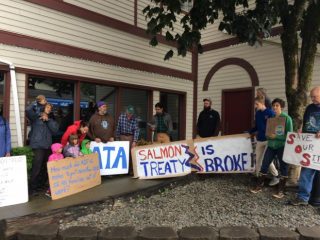
Trollers call for Murkowski’s aid with treaty
“You take our fish, you take our lives!” This is the fourth time salmon trollers have taken to the streets during the 2018 season to protest proposed cuts to the chinook harvest in the Pacific Salmon Treaty. In May, trollers gathered outside Sitka’s Centennial Building prior to the start of a state salmon symposium hosted by ADF&G Commissioner Sam Cotten. When Governor Bill Walker visited Sitka in June, dozens of fishing vessels paraded up and down the harbor, asking that Walker refuse to sign the treaty, if it forced Alaska trollers to trade a share of the king salmon harvest to Canada, to protect endangered stocks in Washington. Trollers then organized a rally in Sitka’s harbor prior to the start of the July 1 opener, where one fisherman symbolically used a flare to burn his boat payments. >click to read<17:41
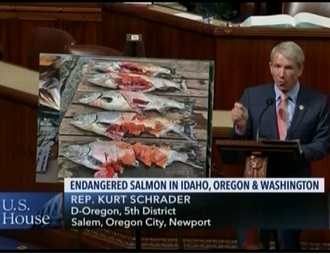
The clock is ticking,,, Endangered Salmon Prevention Act to remove problem sea lions faces time crunch
A bill making its way through the U.S. Senate would allow the states and tribal interests to remove problem sea lions in the Columbia River, including by lethal force, to reduce predation on endangered salmon and steelhead. However, the timeline for the passage of this legislation is growing very short.,, The bill was passed out of committee last week and will be addressed by the full senate soon, but there is a time constraint. If the bill is not passed before Congress adjourns for the year, its future is uncertain. SB 3119 represents the best effort to date to amend the MMPA since its inception to allow stronger management of problem sea lions. It specifically targets animals that take up positions at pinch-points where salmon are forced to concentrate and are easy prey for the pinnipeds. >click to read<10:36
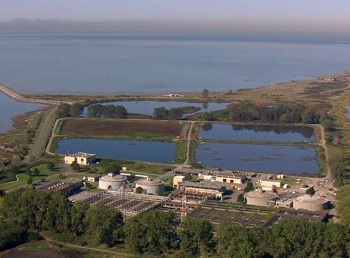
Potent drugs found in West Coast sewage threaten chinook, study reveals
A Seattle expert in environmental contaminants who has linked sewage flushes into Washington state estuaries to higher juvenile chinook salmon death rates suspects human drugs found in fish put them at risk. James Meador of the National Oceanic and Atmospheric administration (NOAA) said he believes pharmaceuticals found in the contaminated water — such as amphetamines and antidepressants — are in part to blame. These drugs and chemicals pass through human digestive systems — and some are flushed directly down the toilet.,, He tested 49 fish for 150 pharmaceuticals, personal care products and industrial chemicals. >click to read<14:08
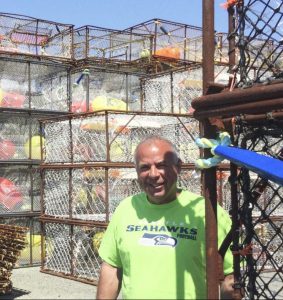
The man who built a better crab trap: Arlington company’s pots stack the decks on reality TV’s ‘Deadliest Catch’
Lance Nylander, company president with 31 years in the industry, obsessed over how to build a better king crab trap. Through grit, trial and error, fair pricing and multi-use trap design, the resourceful entrepreneur and eighth-grade dropout has cornered a crab and fish trap market that has survived complex quota systems, industry rationalization and Chinese knock-offs that were no match for his original. “I quit my competitor, and off I went, started with a thousand units, and it just kind of went from there,” Nylander said of his 1987 business venture. “Four years later, Dungeness Gear Works was number one in the industry.” >click to read<09:32

Pinnipeds, not commercial fishing, depriving Orca of salmon
The plight of the orcas has caught the attention of government leaders after a mother orca was spotted carrying her dead baby for nine days in a row; Tom Nelson of 710 ESPN’s “Outdoor Line” podcast has a few ideas for how the state can help save them. Nelson explains that, unlike other types of orca that feast on pinnipeds such as seals and sea lions, the Southern Resident Killer Whales rely on eating salmon to survive. The grieving mother belongs to the Southern Resident pod. There are not enough salmon being produced at hatcheries to feed the Orca in the Puget Sound, Nelson explained, and increasing development has destroyed the salmons’ homes. “That has put a pinch on the diet of these Southern Resident Killer Whale Orcas, >click to read<16:44
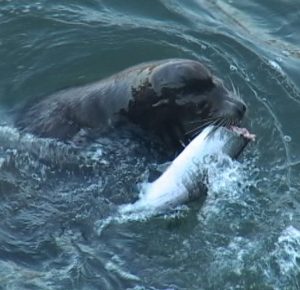
The Endangered Salmon and Fisheries Predation Prevention Act Passed By US Senate Committee
The Endangered Salmon and Fisheries Predation Prevention Act, which helps protect endangered salmon and steelhead populations, passed without objection and will be considered next on the Senate floor. The bipartisan bill would allow wildlife agencies to better protect vulnerable fish populations through science-based management of these invasive, non-ESA listed sea lion populations, while also maintaining a strong Marine Mammal Protection Act that supports research, science-based management, and public process. >click to read<12:33



































